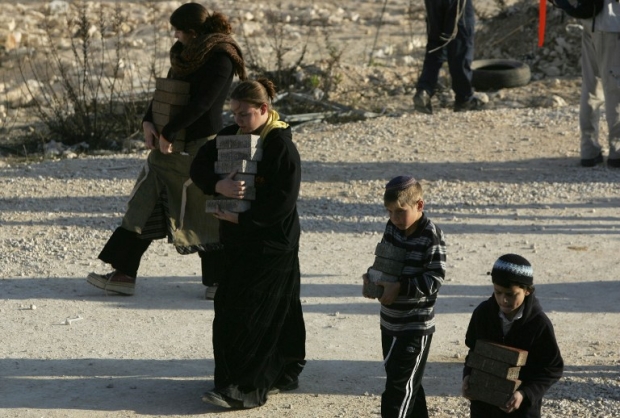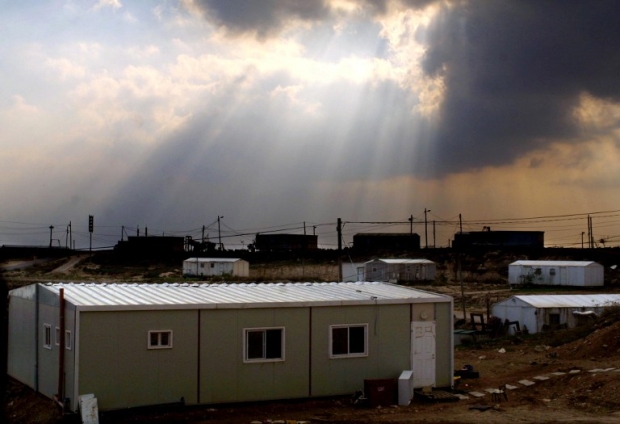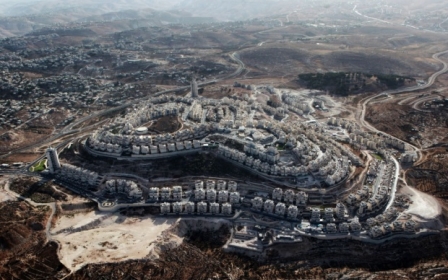The PA should take Israel to the ICC over illegal settlement bill

The Israeli government’s justice adviser has warned ministers that legislating a Settlement Organisation Law will land them in front of the International Criminal Court (ICC) in The Hague.
The bill is a clear example of the methods of deception and fraud resorted to by the occupation state
This very same point has been reiterated by the Israeli prime minister himself and by other members of his government who have expressed concern that they might be pursued, detained and brought to the court.
Despite that, and as a consequence of the pressures exercised by the settlers, the government has continued to pursue this law.
So the question remains: what do we have to do to make sure these people are brought to justice?
A stalling game
In 1995, the settlers resorted to seizing the lands owned by Palestinian citizens in the villages of Silwad, Al-Taybeh and Ain Yabroud and started building a new settlement they named Amona.
The land owners complained to the occupation authorities, which acknowledged that the lands were indeed the villagers' private properties. The owners then appealed to the authorities to evacuate the settlers from their properties.
Settlers exercised all sorts of deceitful manoeuvres and resorted to tricks in order to prevent the return of the lands to their rightful owners. These tactics included forging sale deeds and attempting to seduce land owners with attractive offers so as to sell their properties to them.
READ MORE: Israel pays the price for its incitement over fires - but who is really getting burned?
This game of stalling succeeded until 2008 when landowners went to the Israeli High Court. After so many adjournments, the court ruled in December 2014 that the occupation authorities must force settlers to evacuate Palestinian properties by a deadline not exceeding 25 December 2016.
Legalising theft
Meanwhile, the occupation authorities pursued all avenues to keep the transgressing settlers in place. However, the Palestinian landowners remained adamant, insisting on their right to return to their lands and objecting to any further postponement of the evacuation.
The parliament of the occupying power has no authority to make laws pertaining to the occupied territories. To do so would be considered a measure of annexation by the occupation power
The Israeli government decided not to respect the court’s ruling that the trespassers should be evacuated. It began consultations and a search for legal formulae to legitimise the robbery of privately owned Palestinian land.
A few days ago, the Knesset approved, through a first reading, a draft law that guarantees the theft and robbery of privately owned Palestinian lands and their transfer into the hands of Jewish settlers.
Passing such a law is an action that amounts to a contempt of the high court and total disregard of its rulings. It is also a clear indication that the rule of law ends when matters have to do with the rights of the Palestinians.
Contravening international law
But above all, the legislation is in stark contravention of international law which says that land owned by the inhabitants of occupied territories cannot be confiscated except for military purposes or for the purpose of serving the public interest of its inhabitants.
Therefore, officials who are responsible for passing it could be pursued and prosecuted before the International Criminal Court.
In any case, according to international law, the power of law-making in the occupied territories is vested in the military commander who should only legislate what is in the interest of the inhabitants of the occupied territories and not to serve the interests of the inhabitants of the occupying power.
The bill does not dispossess the owners of their lands but disempowers them of their use, forcing them to hand the land over to Jewish settlers
The parliament of the occupying power has no authority to make laws pertaining to the occupied territories. To do so would be considered a measure of annexation by the occupation power.
All Israeli officials know that what they are doing is in violation of international law. Therefore, they try to pursue a path of deceit and evasiveness to deal with this law.
At one time, they examine the possibility of declaring the settlers to be original inhabitants of the occupied territories and therefore privately owned land can be seized in order serve their interest. Then, upon comprehending the likely consequences of such a designation, they would rescind.
READ MORE: BDS is not the only tactic against Israeli occupation, but it is working
At other times, they have clung to the claim that these are “liberated” territories and not occupied ones and therefore they are not subject to the rule of international law.
Yet, according to international law, the jurisdiction over the West Bank belongs to Jordanian law, which applied to it prior to its occupation by Israel. And this is why the occupation authorities directed their legal advisers to study Jordanian laws and rules in the hope that they will find an exit out of this predicament.
Encouraged by muted criticism
The bill, approved in a first reading several days ago, is a clear example of the methods of deception and fraud resorted to by the occupation state.
According to the proposed law, the lands remain registered in the name of their owners, but they are banned from using them or even reaching them. In other words, the bill does not dispossess the owners of their lands but disempowers them of their use, forcing them to hand the land over to Jewish settlers.
Going to the ICC is a very big responsibility. This is a burden that cannot be loaded solely on the shoulders of the landowners. It is the responsibility of the Palestinian National Authority
So far, Israel has succeeded in seizing public properties and building houses for Jews alone to inhabit. This is a violation of international law.
But because the authorities have not been questioned or taken to court they seem to feel they can get away with such things and have found encouragement to pass this law that legitimises and codifies the theft and usurpation of privately owned lands in hundreds of locations.
Furthermore, he understands that this may see him eventually sitting in the defendant’s chair inside the International Criminal Court. His remarks in which he expresses opposition to the bill are aimed at saving his own skin.
To The Hague?
Palestinian landowners from the villages of Silwad, Al-Taybeh and Ain Yabroud have defended their lands for more than 20 years and have legally pursued the settlers embroiled in the theft of their lands.
They have remained undeterred in the face of seductive offers and threats and have shown impressive determination and steadfastness. The long duration of time has not frustrated their determination.
Going to the ICC is a very big responsibility. This is a burden that cannot be loaded solely on the shoulders of the landowners. It is the responsibility of the Palestinian National Authority whose abstention from going to the ICC is seen as a betrayal of the landowners and a stab in their back.
This authority has disappointed its people so many times. Perhaps this time, it will take action to support the landowners and initiate proceedings to lodge a complaint with the ICC against all the perpetrators.
- Jihad Abu Raya is a Palestinian lawyer and activist based in northern Israel. He is a founder of the Falastenyat Movement.
The views expressed in this article belong to the author and do not necessarily reflect the editorial policy of Middle East Eye.
Photo: A picture taken on 17 November 2016 shows families in a street of the settlement outpost of Amona (AFP)
Middle East Eye propose une couverture et une analyse indépendantes et incomparables du Moyen-Orient, de l’Afrique du Nord et d’autres régions du monde. Pour en savoir plus sur la reprise de ce contenu et les frais qui s’appliquent, veuillez remplir ce formulaire [en anglais]. Pour en savoir plus sur MEE, cliquez ici [en anglais].








